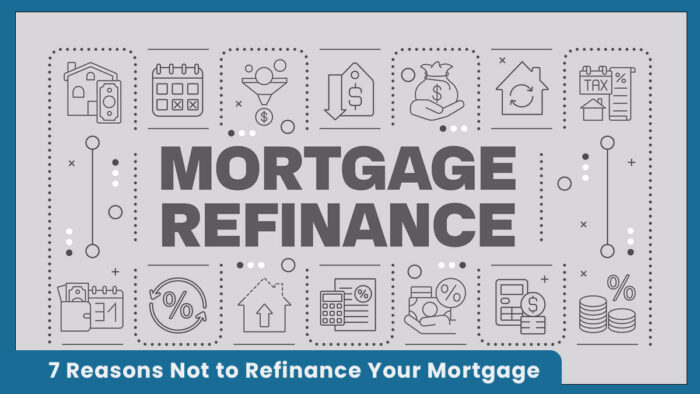7 Reasons Not to Refinance Your Mortgage – Refinancing your mortgage is a significant decision and should be approached carefully. While refinancing can be beneficial in some situations, it’s important not to fall into the trap of lowering your monthly payments at the cost of your long-term savings.

Just like there are pros to anything, there are also cons to look out for when it comes to mortgage refinancing. In this article, we have compiled the list of reasons you should look out for before considering refinancing your mortgage
7 Reasons Not to Refinance Your Mortgage
Refinancing your mortgage means taking out a new loan to replace your current one, often to secure a lower interest rate. However, there are some situations where refinancing might not be the best option. These include:
1. Extending Your Loan Term for Lower Payments
Refinancing gives you the option to extend your loan’s term, such as switching from a 15-year to a 30-year mortgage. This typically lowers your monthly payment, making it easier to manage in the short term.
However, while you’ll save money each month, you could end up paying more over the life of the loan due to the longer repayment period. It’s important to think about the long-term costs to ensure you’re not making a choice that could set you back financially.
2. Consolidating Debt
When you choose a cash-out refinance, you’re using your home’s equity to secure a larger loan. This allows you to pay off your original mortgage and use the extra funds to cover other debts, like credit cards or personal loans.
If you can lock in a lower interest rate, consolidating debt through refinancing can simplify your monthly payments and help you save money over time. However, if you’re refinancing to address debt caused by poor spending habits, the relief may be short-lived. Continuing to incur new debt could lead to financial strain and possibly risk losing your home.
3. Small Savings Over Time
Refinancing to reduce your monthly payment by a small amount may sound like a good idea, but you need to consider the bigger picture. Refinancing typically comes with closing costs, appraisal fees, and other charges that can total 3-6% of the loan amount.
4. Preparing for Your Next Home Purchase
Refinancing can help you prepare for a future home purchase by lowering your monthly mortgage payment. With reduced payments, you can free up extra funds each month to save for a down payment on your next home.
However, if you plan to move within a few years, refinancing may not be the best option. It can take several years to recover the upfront refinancing costs, and moving before reaching your break-even point could result in a financial loss.
5. Switching Your Mortgage Type
Refinancing can also give you the flexibility to change your mortgage type. For example, you could switch from an adjustable-rate mortgage (ARM) to a fixed-rate mortgage, which provides stability by locking in your interest rate.
While a fixed-rate mortgage offers predictability, it could lead to overpaying if rates fall in the future. On the other hand, switching to an ARM could save you money if rates remain low, but there’s always the risk of rising rates, making your payments less predictable.
6. Unlocking Cash for Investment Opportunities
A cash-out refinance allows you to tap into your home equity to access extra funds, which you could use for investments.
While this allows you to grow your wealth, it’s important to remember that you’re borrowing money. If your investment doesn’t pan out, you could struggle to repay the larger mortgage balance, impacting your financial security.
7. Getting a No-Cost Mortgage:
With a no-cost refinance, you won’t pay closing costs upfront. While this might seem like an attractive option, be aware that these costs are often rolled into the loan balance or compensated by a higher interest rate.
It’s important to carefully evaluate whether this option truly benefits you in the long run, as the increased rate or loan amount could end up costing more than paying the closing costs upfront.
How Often Can You Refinance Your Mortgage?
Technically, there’s no legal limit to how many times you can refinance your mortgage. However, some lenders may set their own guidelines to prevent borrowers from refinancing repeatedly and accumulating more debt.
The Bottom Line on 7 Reasons Not to Refinance Your Mortgage
Refinancing your mortgage is a significant decision and should be approached carefully. While refinancing can be beneficial in some situations, it’s important not to fall into the trap of lowering your monthly payments at the cost of your long-term savings.
Before refinancing, make sure to calculate all the costs involved, including closing costs and fees. Refinancing might lower your monthly payments, but it could also extend your loan term, which may end up costing you more over time. It’s crucial to ensure that refinancing is the best choice for your current financial situation, helping you meet your goals without adding unnecessary risks.



